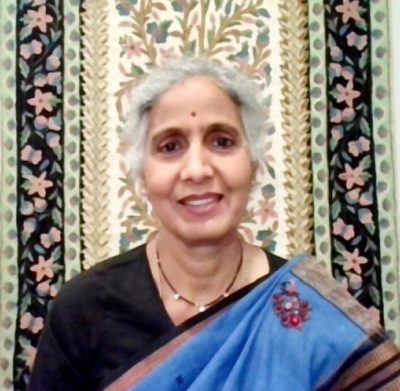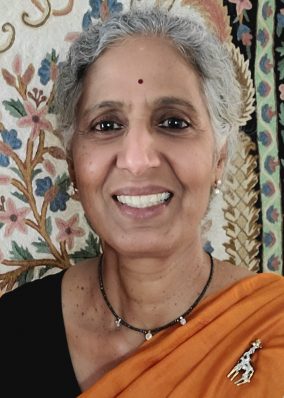
Carnatic Compositions – The Essence and Embodiment
–Aparna Munukutla Gunupudi
Our intent for this essay is to highlight the great features of the language, emotion and melody (rAgam) of a krithi (song/composition) and also to provide the song for your listening pleasure. Most of you may know these krithis, but when you discover the distinct features of a krithi, you may enjoy a new beauty or an attribute in the krithi.
Note: Krithi is defined as a song containing pallavi, anupallavi and charanam that have high musical value and can be sung elaborately with improvisations. Whereas, Keerthana also has a pallavi, anupallavi and charanam but is sung in a single form or simpler pattern.
Krithi: vandE mAtaram
rAgam: Ranjani
tAlam: Adi talam
Composer: Dr. M Balamurali Krishna
Singer: Ragavan Maniyan
Pallavi
vandE mAtaram andi mA taram
anupallavi
mundaDugiDu mana bhAvitaram pondudamAnanda-mandaram
caraNam
virisenu bhuvipai aravindam kurisenu manapai makarandam
merisenu muraLI svarAla andam murisenu kavi gAyaka brundam
Meaning:
vandE – salutations
mAtaram – to the mother
andi – says
mA taram – our generation
mundaDugiDu – steps forward
mana bhAvitaram – our future generations
pondudam – attain
Anandam – happiness
andaram – all of us together
virisenu – bloomed
bhuvipai – on earth
aravindam – lotus
kurisenu – showered
manapai – upon us
makarandam – honey
merisenu – shone
muraLI svarAla andam – beautiful tunes of Murali notes
murisenu – enjoyed
kavi gAyaka – poets and singers
brundam – group
This kruthi is set in a melodious tune and consists of simple and rhyming words. Dr. Mangalampalli Balamurali Krishna is famously known for such style. He uses trick words like MAtaram which means “mother” and when it is split as MA taram means “our generation”. The vedic scriptures define the mother in five forms (Pancha Matruka) – dEha mAta (Biological mother), gomAtha (holy cow), bhUmAta (mother earth), dEsa mAta( motherland) and vEda mAta/jnana mAta. In pallavi, he says salutations to the mother from our generation. In anupallavi, he says our future generations will be blessed to march forward happily. In the charanam, he describes, a lotus/aravindam bloomed on the earth showering the sweetness/makarandam, the shining beauty/andam of the musical notes of Murali and groups of poets & singers / brundam are joyous. He set this kruthi in Ranjani ragam which is a melodious evening ragam yet a powerful one that can take the audience into a different world.
Though it appears as a simple kruthi, it has a significant meaning and a great purpose. It sounds revolutionary when you hear such words as our generation, the future generation, marching forward and so forth. Next, we hear the powerful words Vande Mataram. We immediately recognize it as one of our anthem songs written by Bankim Chandra Chatterjee. With those two words, Balamurali takes the listener to Bengal. Once you are there, if you look around a bit, there you come across Aravind Ghosh. He is the moolakruthi (key role) of this kruthi.
Aravind Ghosh was born in Calcutta in 1872 into a wealthy family and was educated in England. After passing the I.C.S test, he served under the Maharaja of Baroda for some time, and married a girl named Mrinalini. Unfortunately, she died in the influenza pandemic in 1918. After her death, he took an active role in the freedom fight, spiritual preaching and was eventually ordained in 1950, as Sri Aurobindo. Aravind Ghosh, from the influence of his maternal grandfather’s involvement in the activities of the Brahma Samaj, revolutionary ideas became
apparent when he returned from school. Arvind Ghosh, who knew about 12 languages, acquired vast philosophical knowledge. Later he got acquainted with Lokmanya Tilak, participated in Swaraj, Swadesh, national literacy movements and started writing articles defying British rule. While this is going on in earnest, at the same time he was being put in jail with false accusations of some bombing. While in prison, he felt the presence of Swami Vivekananda during his meditations and heard his voices. After his release, he started learning yoga from a yogi. Due to his writings and revolting movements, the British came in search of him with a warrant. But he went into exile and later reached Pondicherry (Puducherry).
In Pondicherry, due to the French rule at that time, the warrant was void. It was in 1910, Aravind Ghosh’s long journey began with his spiritual contemplation, philosophy and later he is referred as Sri Aurobindo. He started a magazine called “Arya” and wrote extensive articles and poems on the Vedas, the Upanishads, the Bhagavad Gita, the Panchabhutas, the Sun, and so forth. An epic poem, called Savitri, which he wrote is known to have twenty-four thousand verses. The Aurobindo Asram was established as the disciples began to gather after listening to his preaching.
Meanwhile, Mirra Alfassa, a French woman, came to Pondicherry with her husband on business. There she met Sri Aurobindo, who, due to her philosophical mentality, became his disciple and later became his prime disciple. When Sri Aurobindo left the materialistic desires and engaged in penance, she took charge of the Asram there. Since some of the disciples were with children, the Asram was made to suit them and all of them were looked after with great love and affection. That is why they started to call her “The Mother ” as everyone thought of her as a mother. Balamurali considers her as vEda mAta/jnana mAta and salutes her.
In this beautiful krithi, Balamurali is paying tribute to Sri Aurobindo by saying the birth of a great man like Sri Aurobindo, is a sweet blessing for all of us. He praises the literature that Sri Aurobindo has gifted to us while highlighting the importance of the mother. Balamurali packs all this in this short and sweet kruthi with a lilting melody. As you listen to this song, which reminds us of our mother, it transcends you to Sri Aurobindo Asram, where you will enjoy the bliss of peaceful meditation.
The power of music is profound
The joy of music is sweet and sound
The awe of music is abound
Music makes the world go round
Ragavan Maniyan is a tech expert and a professional singer. He has given many concerts in India and abroad and he played the key role of Thyagaraja in the documentary “Endaro MahAnubhavulu”. He was the prime disciple of Dr. M Balamurali Krishna and currently resides in Chennai.
*****

Aparna Munukutla Gunupudi is a poet, lyricist and short story writer. She has written dance ballets such as Queen of Jhansi, Prasanna Ashtalakshmi, Usha Kalyanam, Sneham, Jamsetji Tata and they were performed in Kuchipudi and Bharatanatyam styles. She wrote songs for “Prema Tarangini” an audio cassette released by noted music director Sri Manohar Murthy. She considers her parents, who provided and encouraged her in book reading, are her “gurus” and Sri Jandhyala Payayya Sastri as her writing mentor.
